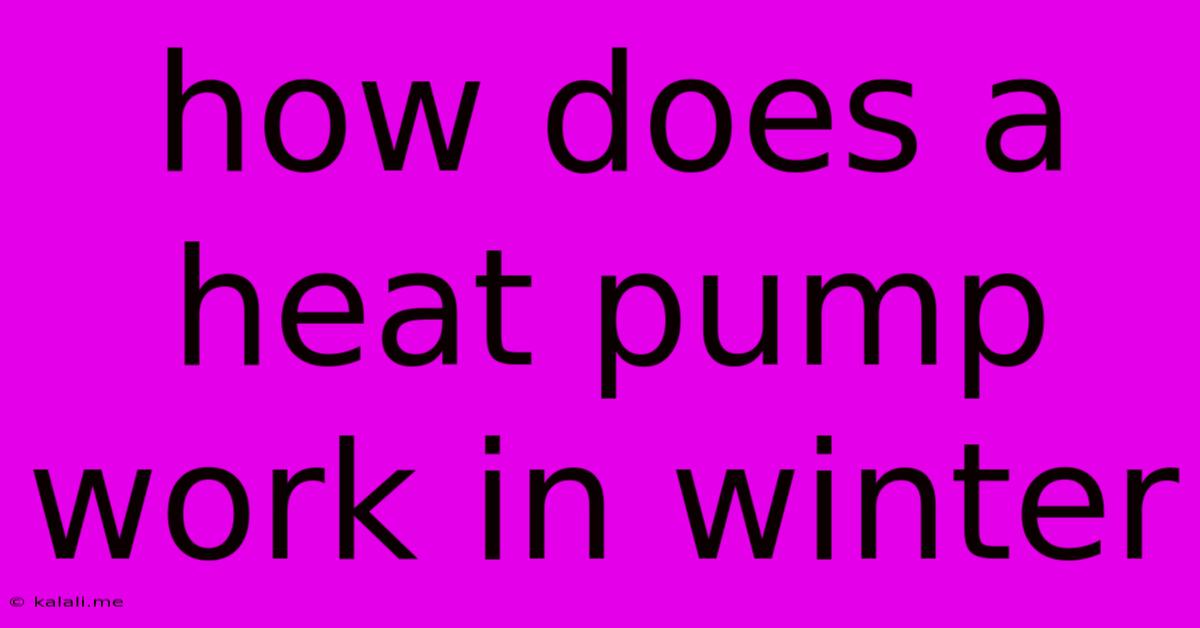How Does A Heat Pump Work In Winter
Kalali
May 28, 2025 · 3 min read

Table of Contents
How Does a Heat Pump Work in Winter? A Comprehensive Guide
Meta Description: Learn how heat pumps efficiently heat your home even in freezing temperatures. This guide explains the heat pump winter operation, including reverse cycle technology and defrost cycles. Discover why heat pumps are a smart, energy-efficient heating solution.
Winter's chill can be a tough opponent, but heat pumps are designed to conquer it. Unlike traditional heating systems that burn fuel to generate heat, heat pumps cleverly extract warmth from the outside air, even when temperatures plummet. This makes them an incredibly efficient and environmentally friendly heating option. But how do they achieve this feat? Let's delve into the fascinating mechanics of a heat pump in winter.
The Reverse Refrigeration Cycle: The Heart of Winter Heating
At the core of a heat pump's winter operation lies the reverse refrigeration cycle. This is the same fundamental principle used in your refrigerator, but reversed. Instead of removing heat from the inside to cool it down, a heat pump uses this process to move heat into your home.
Here's a breakdown of the process:
-
Refrigerant Absorption: The heat pump's refrigerant, a special fluid, starts as a low-pressure, low-temperature gas. It absorbs heat from the outside air, even if it's freezing, through an outdoor unit's evaporator coil. This process slightly lowers the temperature of the outside air.
-
Compression and Heating: This low-pressure, slightly warmer refrigerant gas is then compressed by a compressor. This compression significantly raises both the pressure and temperature of the refrigerant.
-
Heat Transfer: The now high-pressure, high-temperature refrigerant flows through indoor coils (the condenser) inside your home. Here, it releases the absorbed heat into the air, warming your living space. This is where you feel the comforting warmth generated by the heat pump.
-
Expansion and Cooling: After releasing its heat, the refrigerant expands through an expansion valve, dropping its pressure and temperature. It then returns to the outdoor unit, ready to repeat the cycle.
Overcoming the Cold: Defrost Cycles and Efficiency
While heat pumps are remarkably effective in cold weather, they do need to address the potential for ice buildup on the outdoor evaporator coils. This is where defrost cycles come in. These cycles temporarily reverse the process, using some of the heat generated inside to melt any ice and ensure continued efficient operation. This cycle is usually automated and doesn't require user intervention.
The efficiency of a heat pump in winter is largely determined by the COP (Coefficient of Performance). This measures the ratio of heat output to the energy consumed. Heat pumps typically boast higher COPs than traditional electric heating systems, making them a cost-effective and energy-saving solution. However, COP generally decreases as outdoor temperatures drop. This is why choosing a heat pump rated for your region's climate is crucial.
Heat Pump Types and Winter Performance
Different types of heat pumps offer varying levels of performance in sub-zero temperatures. Air-source heat pumps are the most common and generally perform well down to certain temperatures, often supplemented by electric resistance heating for extremely cold conditions. Ground-source heat pumps (geothermal) offer superior performance in cold climates due to the consistent temperature of the earth.
Conclusion: Embrace the Efficiency of Winter Heat Pumps
Heat pumps are increasingly becoming the preferred heating solution for their energy efficiency, reduced environmental impact, and consistent performance even in winter conditions. By understanding how the reverse refrigeration cycle and defrost cycles work, you can appreciate their remarkable ability to transform the cold outside air into cozy indoor warmth. Consider the long-term benefits and consult with a qualified professional to determine if a heat pump is the right heating solution for your home and climate.
Latest Posts
Latest Posts
-
Do Background Checks Include Drug Tests
May 30, 2025
-
How To Measure The Length Of A Sesier Curve Blender
May 30, 2025
-
What Is Ol On A Multimeter
May 30, 2025
-
Timestamp Save As Name In C
May 30, 2025
-
2 Examples Of A Gas Dissolved In A Gas
May 30, 2025
Related Post
Thank you for visiting our website which covers about How Does A Heat Pump Work In Winter . We hope the information provided has been useful to you. Feel free to contact us if you have any questions or need further assistance. See you next time and don't miss to bookmark.